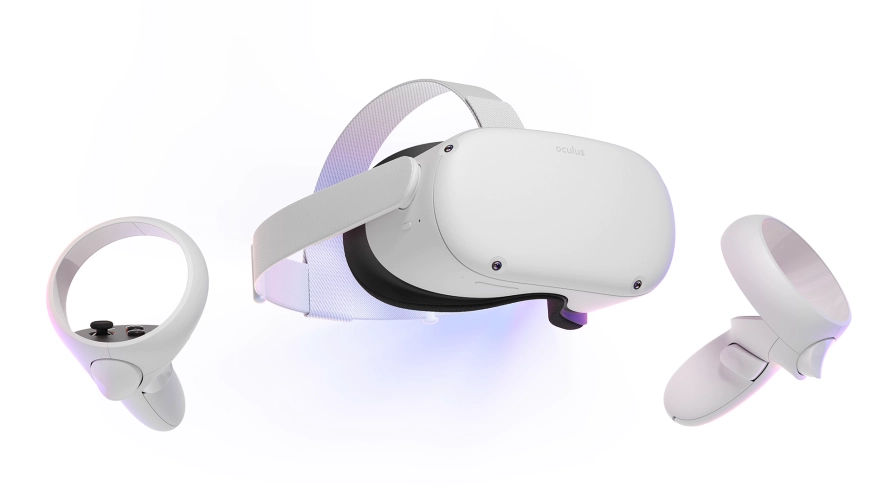
Recently launched Oculus Quest 2 looks like an awesome VR device that any enthusiast will want to try out and an opportunity for any developer to dive into the VR world! It's the next hot thing! Jump on the wave!
All good an dandy until you have to use it, and the only way is to do it using your Facebook credentials. Oculus is running a fork of Android, but that's just an implementation detail. This is an OS controlled by Facebook.

There's no escape
In a similar fashion to your Android phone, your Oculus set is running software that you get to use by accepting Facebook's terms of use. And this grants them tracking control over all the activity you run here. There will be an app store, and Facebook (just like Android) will know your play by play. As written on the Arstechnica article, they will be moderating open spaces, which is alright given all the cyber bullying happening currently (And expect trouble, because it's a very difficult task).
But note that, yet again, access to your hardware is bound to a ToS, and unlike Google and Apple, this one polices your social behavior. So if your Facebook account gets blocked for something on "the website", you will not be able to use your Oculus hardware anymore (Not to mention risk access to your Libra as well). Your hardware and your $300 are effectively "bricked". Note again, your hardware has terms of use. Last time I bought a PC, nobody could make it stop working if they didn't agree with me.
High chances that at launch this Facebook OS will come with some sort of web browser, a Facebook web browser (Blink based, I bet), that will naturally share all your activity to Facebook.
Using this Facebook OS, is like using the Facebook app. Imagine that every "click" and app you use and page you visit on this VR device is happening "inside Facebook". You are not on the web, you are inside Facebook looking at the web through a small window.
How does this relate to Linux?

Let's put aside that Linux is free as beer and speech, that is open source and that 2020 is the year of Linux on the desktop.
Linux' biggest feature this decade is that it is independent.
When you use Linux you don't need to create a user account into any cloud service or register with any other company (the user you have is just local user security). No strings attached.
Your use of Linux is independent from the hardware you buy. You can purchase any (albeit supported) hardware and body can brick you out. You run Linux on it and nobody will police what you do there. Any other proprietary or paid-for OS could do the same thing. This is not about being open source.
Windows, Android, iOS, FacebookOS, HarmonyOS, everything else is now making it seem normal that the company needs to know your username. And the OS position is too powerful. An OS is the gateway to all your software usage. Look at iOS' position, of not allowing other Web or JS engines to run. Apple must be hating that it cannot enforce such policies on MacOS, it would be too evident. But on new devices nobody questions this difference. It's normal for a company to control everything.
The independence in the pieces that form part of your computing experience is a paramount feature, and BigCorp leverages on "better integration" to argue for having control in all the pieces in your experience, from hardware, software, services and sell you an "ecosystem" where everything is easy, but they fully control.
By the same token, sadly, this is why using pieces that follow standards and are independent can be a lesser experience, using Linux, Firefox, duckduckgo, a non gmail/hotmail email, all can yield to a coarser but still fully functional experience.
Just like @doctorow writes, on Unauthorized bread. This future is up on us, you already need to have a cloud account to be able to drive some cars, need to make your your credit card doesn't expire to be able to use your juice machine, and what's worse of it all it's happening so much, we're numb to it, we don't even notice. It's the new normal.
What can be done about it?
I don't know. This is the present we built for. We collectively put our "money" on monopolies to get bigger, and now no individual action will have an effect. No medium size action will have an effect, so we're late enough down this pipe that we can only resort to governments, the only ones left that are still big enough to try to do something about this. And I hope this gets done soon because in a few years not even governments will have enough leverage to tackle this.
But understanding the root of the problem is key, we have monopolies controlling all the pieces of our computing experience, which gives them total knowledge and control on our lives. The way to weaken them is by leveraging competition and helping alternatives flourish. This will definitely mean giving up some comfort. It is their business to make it inconvenient to leave. So know that it will be inconvenient, it is more convenient to keep building on making the monopoly even bigger and have it "future you"'s problem. It's a well lubed paved path easy to glide through.
But I don't have anything to hide, you say
Let's be glad that you're currently in a privileged position where you don't have any major problems, that your elections aren't manipulated, that your countries politics aren't draconian, that your free press is protected. But the fact that a problem isn't affecting you at the moment does not mean a problem doesn't exist. And you wish it had been addressed before it hits you.
